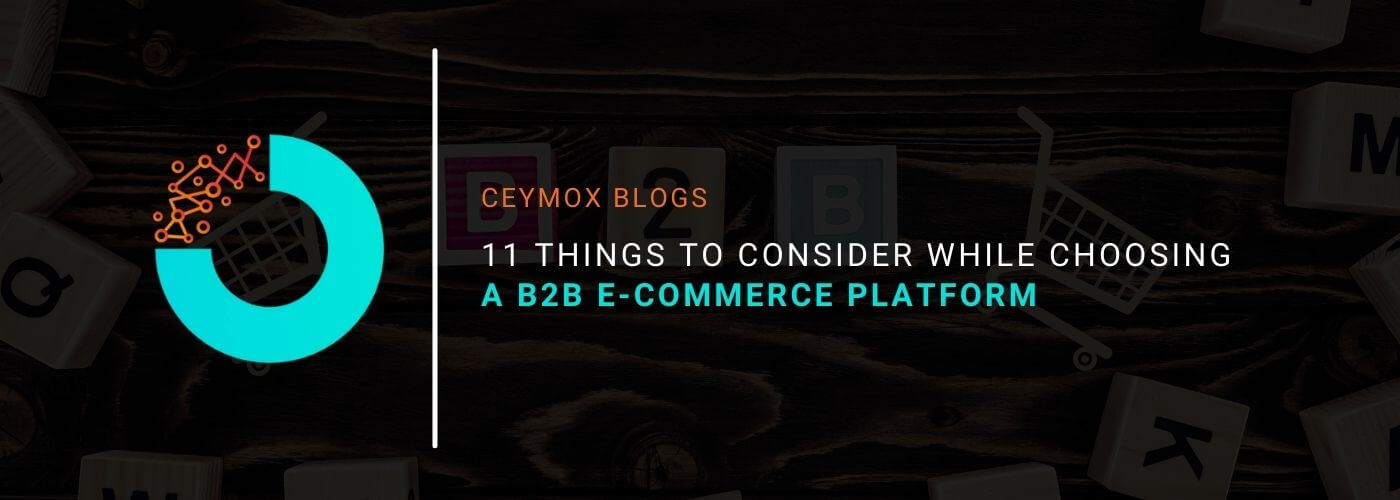
More than half of the existing B2B businesses expect their online platform to increase revenue and customer satisfaction. For choosing the right B2B e-commerce platform, many companies get bids from vendors through an RFP (Request for Proposal) process. An RFP is usually a very detailed questionnaire in which the businesses can mention their requirements or features required.
This process can take several weeks or even months for vendors to complete and too much information can also overwhelm the entities. Also, an RFP developed for B2C may not give you vital information about the platform that you want for your B2B business. You can potentially spend hours reviewing data and still not be sure. Fortunately, a better approach would be to ask B2B-focused questions. In this article, we will go through 11 such questions that you should consider while choosing a B2B e-commerce platform.
1. Presence on the cloud:
Today’s businesses are on the cloud regardless of their size. If your current business is not on the cloud, there will be a time when you have to migrate it to the cloud. Thus, the platform that you are considering should be on the cloud or its enterprise version should be on the cloud so that you can easily migrate later.
2. Customizability:
Most B2B businesses want to design a custom buying experience and offer special options for large accounts. Almost every B2B business has to tweak its functionality after a period of time when it is expanded into other regions or acquired new businesses. Thus, the chosen B2B e-commerce should be flexible enough so that it can evolve with your business.
The development team should be able to make customizations on the platform. Although customization is possible through a no-code process at some level, it will require at least some code. That’s why the code of the platform should be accessible to the developers. They should be able to preview the changes and rollback. A platform is better if its different parts can be used separately. For e.g. in some platforms, there is support for headless configuration in which packaged e-commerce workflows are connected to a custom CMS.
3. Support for customer-specific products and pricing:
Unlike in B2C, in the B2B companies, there isn’t a single catalogue to serve buyers. Instead, there are multiple versions of the catalogue for different groups of customers, and there is custom pricing in these versions. If you also want the same feature in your B2B store, then you will require a platform that can support custom catalogues and pricing.
While having a conversation with your development agency vendor, you must get answers for:
- How the custom catalogues & unique pricing will be set up and will reflect in the site experience?
- How much customization would be possible with or without code?
- Is it possible to manage and make updates to multiple custom catalogues?
- How the solution can integrate with ERP solutions to enable custom catalogues and pricing online?
4. Personalization support for different roles like “buyer” and “procurement” manager:
We have observed a rapid evolution in the B2B sales. And it is also worth noticing that B2B buyers have more varied interests than B2C buyers. For instance, the B2B buyers who want product information. Thus, if you want to sell to larger groups, the platform should support personalized content and give different levels of permissions to different user types. You should ask these questions to the e-commerce development agency:
- Does the platform support personalization with native functionality and extensions?
- Know how the user profile will work and support personalization
- Is there any option for configuring different buyer roles and permissions to control who can submit quote requests, place orders, check pricing, or access any particular information?
5. Support for multichannel sales and order management:
Just like B2C, there isn’t a single channel by which B2B businesses interact with their customers. You can sell through your B2B store, by distributors, and through marketplaces such as Amazon, Ebay, etc. For this, the e-commerce platform should have support for multi-channel selling. Here are the questions that you should ask your e-commerce development company in this regard:
- Ask about the multichannel capabilities including inventory tracking, intelligent fulfillment, and marketplaces support.
- Options for cross-border sales like multi-language options, payments, taxes, and shipping providers
- If you have physical outlets at multiple locations, ask them how the platform can integrate online and offline experiences by allowing buyers to purchase online and pick up in-store, or ship online orders from stores for faster fulfillment.
6. Customer shopping journey easiness:
Another reason why B2B customers prefer e-commerce purchasing is that it is easier to buy in e-commerce than traditional commerce. Thus, the e-commerce platform should support a wide range of fast and flexible buying options. Ask the e-commerce development team how they can cover:
- Online price quotes
- Fast ordering in which B2B buyers can upload a list of SKUs
- Requisition lists
- Easy reordering from past orders
- Ability for sales representatives to create orders for the customers.
7. Self-service account management tools availability:
B2B customers always want visibility into their accounts. Earlier, they could call an account manager or the customer service team for daily tasks or status updates. But with e-commerce, they just want to login into their account and get instant information about the purchases, orders, or services they need. If you have an e-commerce platform with self-service account management tools then this is a great thing. Your account reps will field fewer support calls and spend more time on strategic sales. There must be functionalities such as assigning roles & permissions to buyers, shipping addresses management, tracking shipping status, quotes and order tracking, activity reports sorted by the buyer, purchase reporting, and historical reports. Get these answers from your e-commerce development team:
- How to customize the account dashboards such as displaying orders across channels, scheduling deliveries, looking for warranty information, etc.?
8. Content Update Facility:
Just like the B2C companies, the B2B companies also utilize the content for supporting the entire customer journey. Content is highly essential to launch new products, make changes in the product, CMS pages, messaging, etc. It is also how you can respond to market changes and emerging customer concerns. Content is also vital for the SEO strategy of your store. In fact, how quickly you can publish new content can define the success of your business. Making changes in the content shouldn’t require any coding or technical knowledge. Ask your development agency:
- Does the non-technical team would be able to create pages and add content to the site?
- Can you add images, videos, promotional banners, sliders, etc. to the content?
- How quickly new content can be deployed?
- Preview content to review and test the content updates
9. Integration with ERP, CRM, CMS, PIM and other systems:
The B2B e-commerce platform shouldn’t work in a vacuum. It should be able to communicate with existing CMS, ERP, CRM, PIM, and other management systems for easy data sync and business intelligence reporting. Thus, you should create a list of platforms which you want to integrate with your e-commerce platform and include them in your question.
10. Ability to handle mobile commerce:
Mobile commerce is not a choice but a necessity. Just like the B2C customers, the B2B customers also prefer to use their accounts from mobile devices. They may or may not make a purchase through a mobile device as it involves adding a large number of quantities but certainly they will check the dashboard or track orders. Thus, it is essential that the platform should provide responsive web design and can utilize mobile features.
11. Business Intelligence Capabilities:
Business intelligence can help you stay ahead of your competitors by knowing what your customers want and by analyzing the data collected. You can identify customer buying patterns, age or gender of customers, profitable accounts, product demand, etc. This can help you in making better decisions for your business. There must be a centralized dashboard for BI, an easy-to-use report generator, and it should be able to consolidate data from your store and get a holistic view.
Why should you choose Adobe Commerce?
Adobe Commerce is the only e-commerce platform that stands on all these points and has all the essential features that a B2B e-commerce platform should have. It lets you deliver a very personalized customer experience, make better decisions with its business intelligence tools, be highly responsive for mobile and other devices, B2B quotes Customer segmentation, user controls and much more.
How we can help?
At Ceymox Technologies, we are having more than 10 years of experience in developing e-commerce stores from scratch. We understand the unique requirements of a B2B store and can develop a next-level B2B e-commerce store. We will first analyze your requirements and will answer all your questions about how we can meet all your needs using Adobe Commerce and then start developing the B2B e-commerce store.
 Hubspot SEO Certified |  Hubspot SEO II Certified |  Google Ads Search Certified |  Google Analytics Certified |
Sreehari N Kartha is a skilled Digital Marketing Analyst at Ceymox, certified in SEO. His expertise encompasses a wide range of digital marketing strategies, including managing advertising campaigns on platforms like Google Ads, Facebook Ads, Instagram Ads, WhatsApp Ads, and LinkedIn Ads. With a strong foundation in SEO and SMM, Sreehari is adept at optimizing online visibility, driving engagement, and generating qualified leads and conversions. His passion for emerging technologies, such as Crypto, NFTs, and Web3, further complements his skillset, enabling him to navigate the dynamic digital landscape.
View All Articles